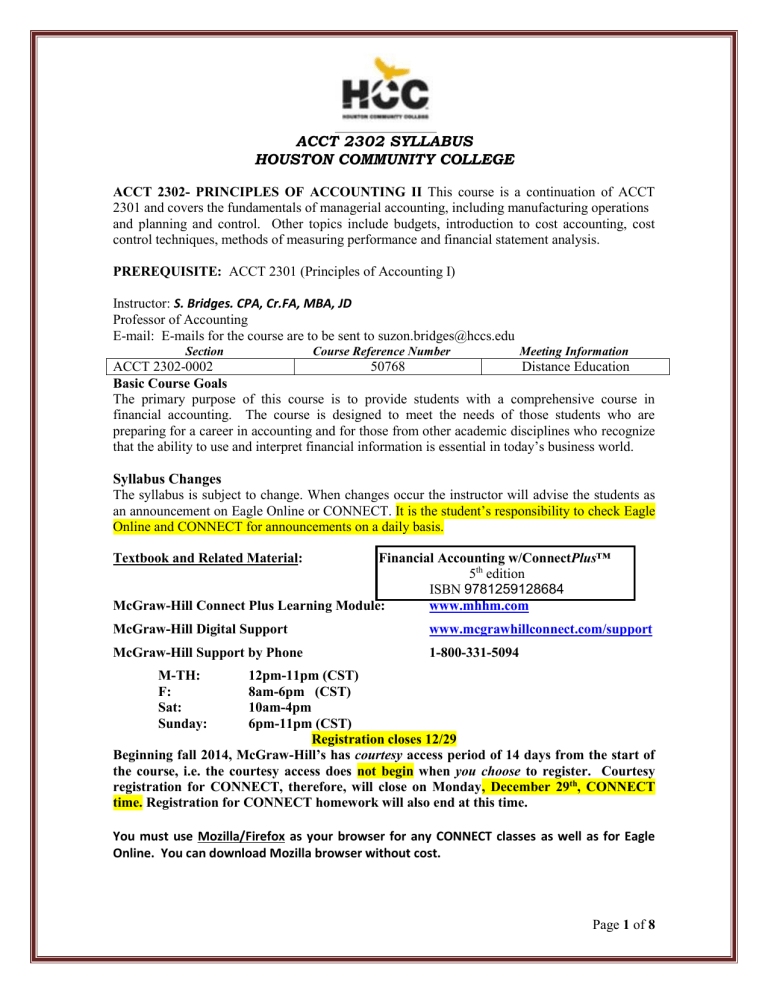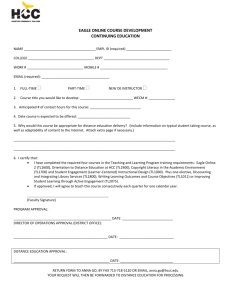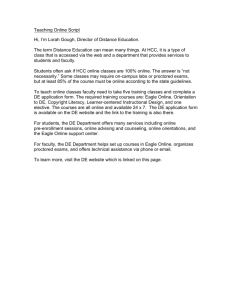Prin II Syllabus Spring 2015 Mini TermR.doc

ACCT 2302 SYLLABUS
HOUSTON COMMUNITY COLLEGE
ACCT 2302- PRINCIPLES OF ACCOUNTING II This course is a continuation of ACCT
2301 and covers the fundamentals of managerial accounting, including manufacturing operations and planning and control. Other topics include budgets, introduction to cost accounting, cost control techniques, methods of measuring performance and financial statement analysis.
PREREQUISITE: ACCT 2301 (Principles of Accounting I)
Instructor: S. Bridges. CPA, Cr.FA, MBA, JD
Professor of Accounting
E-mail: E-mails for the course are to be sent to suzon.bridges@hccs.edu
Section Course Reference Number Meeting Information
ACCT 2302-0002 50768 Distance Education
Basic Course Goals
The primary purpose of this course is to provide students with a comprehensive course in financial accounting. The course is designed to meet the needs of those students who are preparing for a career in accounting and for those from other academic disciplines who recognize that the ability to use and interpret financial information is essential in today’s business world.
Syllabus Changes
The syllabus is subject to change. When changes occur the instructor will advise the students as an announcement on Eagle Online or CONNECT. It is the student’s responsibility to check Eagle
Online and CONNECT for announcements on a daily basis.
Textbook and Related Material: Financial Accounting w/ConnectPlus™
5 th edition
ISBN 9781259128684
McGraw-Hill Connect Plus Learning Module: www.mhhm.com
McGraw-Hill Digital Support
McGraw-Hill Support by Phone www.mcgrawhillconnect.com/support
1-800-331-5094
M-TH:
F:
Sat:
Sunday:
12pm-11pm (CST)
8am-6pm (CST)
10am-4pm
6pm-11pm (CST)
Registration closes 12/29
Beginning fall 2014, McGraw-Hill’s has courtesy access period of 14 days from the start of the course, i.e. the courtesy access does not begin when you choose to register. Courtesy registration for CONNECT, therefore, will close on Monday, December 29 th , CONNECT time. Registration for CONNECT homework will also end at this time.
You must use Mozilla/Firefox as your browser for any CONNECT classes as well as for Eagle
Online. You can download Mozilla browser without cost.
Page 1 of 8
Evaluation and Requirements
Accounting is a discipline. It is the language of business and is an exciting and challenging subject. At Houston Community College, the SCANS (Secretary’s Commission for Achieving
Necessary Skills) workplace competencies and foundations skills have been integrated into
Principles of Accounting. The background of SCANS as well as the skills and competencies identified by this commission are discussed at the end of the syllabus.
Students are responsible for the “learning objectives” at the beginning of each chapter. They are expected to read all assigned chapters, and complete the assignments by the due dates indicated in
CONNECT Plus. Because of the diverse backgrounds of students, students are expected to raise questions regarding areas that they have read and do not comprehend. Raising questions will aide me in teaching critical thinking skills recognized by the Commission as one of three foundation skills.
Accounting is best learned through careful reading and doing problems. This will require a considerable commitment of time and effort from you as in any distance education course. This subject cannot be mastered passively. The concepts and ideas can be compared to building blocks, i.e. each serves as a foundation for new ones. It is extremely important that each student be actively involved in the learning process. The upshot: log into Eagle by December 17 th using the User ID or W number that you were issued upon admission and the password you created for your HCC Email (issued upon enrollment through the Student System), register for
CONNECT, read and comprehend the textbook, be attentive to instructor’s postings in Eagle or
CONNECT, complete the required assignments and exams, and ask for help if you cannot resolve a question. I will provide a link to CONNECT in Eagle.
Note that any publisher’s material posted within the websites involved in this course is subject to copyright law.
I am providing the solutions to the end-of-chapter problems in Eagle Online . The solutions will be for the numbers used in the text problems. Many of your homework assignments are algorithmic. The problems are the same as the textbook, but the numbers may be different. The solutions provide guidance on how an exercise should be done, and of course, I am here to answer your questions. Again, publisher’s material posted is subject to copyright law.
In my courses, students are expected act ethically as espoused by SCANS. In addition, they are to display courtesy both to me and fellow classmates in accordance with the personal quality skill of sociability identified by SCANS.
Professional behavior and a positive attitude are expected .
SCANS require that students learn to communicate effectively in the workplace, so e-mails are expected to have correct punctuation and capitalization.
Page 2 of 8
Evaluation Requirements-Grade is based on the following:
2 Sectional Exams Online
(Best score of two attempts)
Class Contribution, Quizzes, Homework ( no late homework accepted, but I do take the best score of allowed attempts)
Total
160 points
200 points*
360 points
Grading Scale
90 - 100%
80 - 89%
=
=
70 - 79%
60 - 69%
=
=
BELOW 60% =
A
B
C
D
F
(324 to 360 points)
(288 to 323 points)
(252 to 287 points)
(216 to 251 points)
( 0 to 215 points)
*The maximum amount of homework points required for the 200 points=1000
Your homework points earned will, therefore, be your homework points/1000*200
Drops and Withdrawals
It is the responsibility of each student a) to know the official drop date and, if necessary, b) to officially drop or withdraw from a course.
Failure to officially withdraw may result in the student receiving a grade of F in the course. HCCS professors no longer may give a W after the official drop date.
International Students: Receiving a W in a course may affect the status of your student visa.
Once a W is given for the course, it will not be changed to an F because of visa considerations.
Students who repeat a course for a third time (or more) will face significant tuition/fee increases at HCC and other Texas public colleges and universities. Please seek tutoring and other assistance if you are not receiving passing grades.
Beginning fall 2007, the State of Texas imposes penalties on students who withdraw/drop courses excessively. Students are limited to no more than six total course withdrawals throughout their educational career at a Texas public college or university. Students are encouraged to review the
HCC 6 Drop Policy .
Course Assignments
A copy of the assignment schedule will be posted on Eagle Online and CONNECT. Homework is submitted on CONNECT.
I cannot deny that accounting requires careful reading and involvement. Do not wait until the last minute regarding material you do not understand. I want you to succeed! Contact me relating to concepts and problems that you do not understand. It is important for you to acquire awareness of accounting. It is the language of business and, even if you do not plan to major in accounting, accounting is part of business planning and strategy. Because this is an online course, I cannot meet with you; however, let your fingers do the walking and simply e-mail me.
Although it is the responsibility of the student to drop or withdraw the course, for non-attendance, the instructor has full authority to drop student for excessive absences.
Examinations
In accordance with the SCAN skills discussed on the following pages, students are expected to raise questions regarding areas that they have read and do not comprehend. The examinations cover material in the chapter. Students should prepare accordingly throughout the semester.
Page 3 of 8
There will be a total of two sectional examinations. There will be no make-up examinations. If you do not take an exam, you will not receive any points for the exam.
Incompletes
According to HCC policy, an incomplete is at the discretion of the instructor. My policy is not to give an incomplete.
Students with Disabilities
Any student with a documented disability (e.g. physical, learning, psychiatric, vision, hearing, etc.) who needs to arrange reasonable accommodations must contact the Disabilities Services
Office since faculty is authorized to provide only the accommodations requested by the Disability
Support Services Office.
Disability Support Services Offices:
System: 713.718.5165
Central: 713.718.6164 (Includes Deaf and Hard of Hearing Services and Students Outside of the
HCC District service areas)
Northwest: 713.718.5422
Northeast: 713.718.8420
Southeast: 713.718.7218
Southwest: 713.718.7909
To visit the ADA Web Site, log on to www.hccs.edu and click Information for Students. Click again on Students and Choose Disability Services.
Academic Honesty
Students are responsible for conducting themselves with honor and integrity in fulfilling course requirements. Penalties and/or disciplinary proceedings may be initiated against a student accused of scholastic dishonesty and include a zero on the assignment or an F in the course.
Scholarly dishonesty includes, but is not limited to, cheating on a test, plagiarism, and collusion.
It includes the appearance of impropriety. Those that allow others to copy their work are exhibiting scholarly dishonesty.
All assignments in this class are individual assignments unless specifically designated otherwise . The work that you turn in is to be your work product and not simply copied from another person or source. You are not to allow others to copy your work.
HCCS Website
Our website is: www.hccs.edu
CONNECT Website (Note: Homework assignments are required to be submitted in
CONNECT. ACCESS TO COURSE ASSIGNMENTS will be AVAILABLE December 15, 2014)
In conjunction with the SCAN workplace competencies, the course has incorporated the use of computers to aid the student with comprehension of the material as well as enhance intellectual communication with other classmates. Note that publisher’s material located on this website is subject to copyright law.
Page 4 of 8
If you have trouble registering with the URL provided in Eagle Online on the first day of class , you will need to contact the McGraw-Hill technical support. The technical support number is on the first page of this syllabus and is posted in Eagle as well as CONNECT.
Once you have registered , you will be able to use the CONNECT link in Eagle Online to access the homework assignments. Registration for CONNECT ends on Monday, December
29 th with the end of McGraw-Hill’s courtesy access.
Eagle Online 2.0 Website
You can reach the Eagle Online website without going through the Northwest College homepage by simply going to: eo2.hccs.edu. Be sure to use the latest version of Firefox as your browser.
Eagle Online 2.0 can also be reached by going to the HCCS homepage and clicking on
Information for Students. As you can see your Eagle Online 2.0 login user ID will be your HCC
User ID (sometimes referred to as the “W” number). Your password will be the one you created for your HCC Email (issued upon enrollment through the Student System).
For Eagle Online documentation, tutorials (including movies), phone and chat support, go to the
HCC Eagle Online support website
. Phone support: 713-718-2000, options 4, 2, 3 (available
24 x 7)
You are expected to check announcements and discussion postings in Eagle Online 2.0 and
CONNECT on a regular basis.
Note that any publisher or proprietary material posted is subject to copyright law.
Assignment Schedule
A copy of the assignment schedule will be posted on Eagle Online and CONNECT.
EGLS3-Evaluation for Greater Learning, Student System
At Houston Community College, professors believe that thoughtful student feedback is necessary to improve teaching and learning. The college has requested that during a designated time, you respond to researched-based questions related to instruction.
Distance Education:
The Distance Education Student Handbook is located at: http://de.hccs.edu/portal/site/de/menuitem.2b6e81332bdb11b9759b8e10507401ca/?vgnextoid=6f b5596a7e1ff110VgnVCM2000001b4710acRCRD&appInstanceName=default
Page 5 of 8
Overall Learning Objectives of this Course
illustrate an understanding of basic cost accounting
illustrate ability to prepare budgets & interpret cost control techniques
illustrate ability to apply various methods of measuring performance
illustrate understanding of financial statement analysis using ratios
Specific Learning objectives o compute under/over applied overhead cost o compute equivalent units of production o prepare income statements using both the variable & absorption costing methods
1.4 use activity based costing and understand its limitations o prepare budgeted income statements o prepare reports that show revenue & spending variances o compute delivery cycle & throughput times and manufacturing cycle efficiency o prepare a drop or retain segment analysis o interpret financial statements in comparative & common-size format
Our Entire Academic Discipline/CTE Program Learning Outcomes
1. Students will be able to read, listen, speak, and write proficiently in preparation for presentations with clients, accounting firms and compliance work.
2. Students will demonstrate complete understanding of the complete accounting cycle.
3. Students will be able to prepare financial statements and tax returns, utilizing computerized software packages such as Turbo Tax, Peachtree, and/or QuickBooks.
4. Students will be able to reconcile and verify account balances, audit for internal control, and prepare financial statements.
Page 6 of 8
SCANS-Secretary’s Commission for Achieving Necessary Skills
SCANS workplace competencies and foundations skills have been integrated into Principles of
Accounting.
Background - What skills will prepare our youth to participate in the modern workplace? What skill levels do entry-level jobs require? In 1990, Elizabeth Dole, then Secretary of the Department of Labor, established the Secretary's Commission on Achieving Necessary Skills (SCANS) to answer these questions.
Specifically, the Commission was directed to advise the Secretary on the level of skills required to enter employment. In carrying out this charge, the Commission was asked to do the following:
Define the skills needed for employment
Propose acceptable levels of proficiency
Suggest effective ways to assess proficiency, and
Develop a dissemination strategy for the nation’s schools, businesses, and homes
SCANS research verifies what we call workplace know-how that defines effective job performance today. This know-how has two elements: competencies and a foundation . This report identifies five competencies and a three-part foundation of skills and personal qualities that lie at the heart of job performance. These eight requirements are essential preparation for all students, whether they go directly to work or plan further education. Thus, the competencies and the foundation should be taught and understood in an integrated fashion that reflects the workplace contexts in which they are applied.
The five SCANS workplace competencies identified by the Commission are the following:
1.
Resources-An ability to identify, organize, and allocate time, money, materials, space, and people. Much of what you do in the classroom can help students develop competency with resources. Emphasize planning skills in relation to preparing, working, and completing assignments.
2.
Interpersonal-Skills to participate as a member of a team, teach others, serve customers, exercise leadership, negotiate, and work with others possessing diverse backgrounds.
Cooperative/collaborative learning activities are an effective way to teach interpersonal lessons and challenges of the activities.
3.
Information-An ability to acquire, organize, evaluate, interpret, and communicate information along with using computers to process information. Competency with information is basic to any classroom. Emphasize those efforts to master information skills prepare students for future employment.
4.
Systems-An understanding of social, organizational, and technological systems; ability to monitor and correct performance; a competence in the design and improvement of systems. Look for opportunities for students to use critical thinking skills to identify and analyze systems in their school, community, nation, and world.
5.
Technology-The knowledge and skill to select equipment and tools, apply technology to specific tasks, and maintain and troubleshoot software and hardware. Although there are many forms of technology that can be used in your class, computers create real interest and opportunities for your students. Encourage your students to make computers an important part of their education, whether the computers are used in self-paced learning or in-group projects.
Page 7 of 8
Conclusion -The three SCANS foundation skills identified by the Commission are the following:
1.
Basic Skills-Reading, writing, mathematics, listening, and speaking. Classroom activities can develop and reinforce all these basis skills. Teaching these skills in the classroom can provide cross-curricular opportunities.
2.
Thinking Skills-Creative thinking, decision making, problem solving, seeing things in the mind’s eye, knowing how to learn, and reasoning. During their careers, students will need this foundation to adapt to a rapidly changing society. Helping students to think critically becomes very important so that they may adjust to change. Seek opportunities for students to stretch their minds, find new answers, ask hard questions, and lay foundations for lifelong learning.
3.
Personal Qualities-Responsibility, self-esteem sociability, self-management, and integrity. Throughout their lives, your students will need to get along with others, e.g. classmates, friends and family, customers, and co-workers. Look for changes to reinforce good personal qualities and remember the power of teaching by example.
Page 8 of 8


